
Guests
- Nina Turnerformer Ohio state senator and former Cleveland city councilmember.
While covering the Republican National Convention in Cleveland, Democracy Now! visited Cudell Park, where Tamir Rice was gunned down by two officers in November of 2014 while he was playing with a toy pellet gun. A 911 caller reported seeing Rice with a weapon, but noted it was “probably fake.” That information was not relayed to the responding officers, who shot him within two seconds of arriving at the scene. A grand jury failed to bring charges against either of the officers. In April, Cleveland officials agreed to pay $6 million to settle a lawsuit by the family of Tamir Rice. We speak with Nina Turner, who is a former state senator and former city councilmember whose son is a police officer and husband is a retired police officer.
Transcript
AMY GOODMAN: We turn now to this city of Cleveland to remember Tamir Rice, the 12-year-old boy who was shot dead by police in November of 2014 while he was playing in a local park with a toy pellet gun. A 911 caller reported seeing Rice with a weapon, but noted it was probably fake. That information was not relayed to the responding officers, who shot him within a few seconds of arriving at the park. A grand jury failed to bring charges against either of the officers. In April, Cleveland officials agreed to pay $6 million to settle a lawsuit by the family of Tamir Rice.
Well, at the beginning of this week, when we first came to Cleveland, I spoke to former Ohio State Senator Nina Turner about Cudell Park, where Tamir was killed. I asked her to talk about what happened.
NINA TURNER: Yeah, a gentleman made a phone call, and he was actually sitting right under—you know, under this breezeway here, and he made a call because he saw Tamir Rice walking back and forth with what appeared to be a gun. And he did say to the dispatcher very clearly that it might be a toy gun, and the person that I’m describing might be a child, but I’m not sure, but he’s scaring the hell out of people, I think was how he framed it on that day. The police officers came here. And it appears from the video footage that they really slid up because of the ice and the snow. And they saw what they thought was a real gun, and they just opened fire on Tamir. I think it was less than 10 seconds of them getting on the scene.
What makes it so gut-wrenching, besides the fact that Tamir Rice was 12 years old, is the fact that if you look at the video footage, Tamir Rice never had a chance to respond to the police being there. There was no “put up your hands, put the gun down.” None of that. He was just shot instantaneously. And I’ve talked to lots of Cleveland police and other experts, who really believe a lot of that had to do with how the police officers pulled up on the scene.
AMY GOODMAN: And explain how they pulled up and what then happened with Tamir’s sister, who was just a few—
NINA TURNER: Yeah.
AMY GOODMAN: —years older, 14 years old at the time.
NINA TURNER: Fourteen years old. I mean, they pulled up. And anybody, any of your viewers can go and watch the footage. They pulled up on the scene in a way that does not appear that they used the tactics that they’re taught. First of all, you’re supposed to take cover as a police officer, as I’m told. I live with two police officers in my household. So they really did put themselves in danger, if in fact that gun had been real. But what they did not allow is for Tamir Rice to even recognize the fact that they were on the scene. The passenger, the police officer that was on the passenger side, shot Tamir Rice in less than two seconds from the car hitting the scene. Tamir Rice’s sister came on the scene, and they tackled her. And they placed her in a car right next to where her brother’s body was, like no sensitivity whatsoever—
AMY GOODMAN: As he lay dying right outside the car, right here.
NINA TURNER: —that his sister—right outside. No sensitivity. They did not perform CPR on Tamir Rice. As a matter of fact, an FBI agent that was doing some work within the city of Cleveland got the call, you know, over the radio, and he actually came here and started the CPR on Tamir Rice. So, again, you know, no sense of we are going to try to save his life or to see what is going on with him. It was just, in my mind, just a cavalier attitude that the police had at the time when they entered the scene. And it goes back to what do black—you know, why black lives—the whole slogan, does black—do black lives matter? And how do we respond as a nation and as a community when black folks are—lay dying?
AMY GOODMAN: So, it turns out the record of the officers—I mean, Officer Loehmann, who actually pulled the trigger—
NINA TURNER: Yes.
AMY GOODMAN: —was forced out of the police department.
NINA TURNER: In Independence, yes, he was. And had the Cleveland police investigated his record a little further, one of his commanding officers said that he was nervous around—you know, with guns. They noticed this.
AMY GOODMAN: They said he had low-impulse control.
NINA TURNER: Low impulse, he did. And he probably should have never been hired. But hindsight is 20/20, and everybody can go back and Monday morning quarterback. But knowing what we know now, he probably should have never been hired to be a Cleveland police officer.
AMY GOODMAN: And Officer Garmback had a case of excessive force against him—
NINA TURNER: Yes.
AMY GOODMAN: —that ended up in something like a six-figure settlement for his victim.
NINA TURNER: Yes, he did. And it is these types of patterns that cause the African-American community pause, that cause people who believe in justice and equality for all to kind of step back and say, “Wait a minute, justice and equality doesn’t happen for African-American folks.” You know, I know that you interviewed Professor Eddie Glaude from Princeton. He wrote a book called Democracy in Black, where he talks about the biggest gap that we have in this country is a value gap, the fact that African-American lives really are not as valued as the lives of our white sisters and brothers in this country. And we really need to come to grips with this.
What happened to Tamir Rice is probably one example of that, notwithstanding that the gun—I must say that the gun looked real. I get that. But what the biggest problem is, is that the way the police officers rolled up on the scene, they never gave this little boy a chance to respond to their presence. Police officers are not judge, jury and executioner. You are supposed to bring the person in. I would dare say that had they not rolled up on the scene in this way, and that Tamir Rice was given the command, “Drop your weapon!” you know, I think he would have did just that. And now that it turns out that a 12-year-old boy is dead, because he didn’t get a chance, and that’s really what is at the crux of this.
You know, and again, this was right before Thanksgiving. My heart was heavy. You know, I was ending my term in the Senate. And I called—Governor Kasich happened to call me, Amy, the day before Thanksgiving, and he wanted to know what is happening in Cleveland, how are people feeling. And I was able to say to the governor, “Governor, people are feeling heavy. And as a matter of fact, I just wrote you a letter, Governor, and I’m not putting things in writing to politic you, and I’m not writing a letter as a senator. I’m writing a letter as an African-American mother of an African-American son, who I had fear for his life every single day, who his father and I taught him that as a black man in America, don’t make sudden moves, you know, listen to the police officers, make sure that you”—see, a lot of other parents don’t have to necessarily teach that lesson to their child, but every black mother has to teach that lesson to their child, because, again, they are seen as more criminal than anybody else. My heart ached. And the governor said, “You know, Nina”—and I said, “Governor, I want to come to see you. I have some recommendations.” And he said, “Come see me.” And that is really how the task force that we created was born. The governor did care about what happened here.
AMY GOODMAN: So you talk about speaking to your son, your African-American son, who is an African-American police officer now.
NINA TURNER: Yeah. Yes, he is.
AMY GOODMAN: And your husband was an African-American police officer.
NINA TURNER: Yes. So I understand from both sides of the equation. I understand from those black mothers who fear for their children’s lives every single day, especially black males, but not exclusively black males. But as my husband reminds me, he said, “Baby, when I’m behind the wheel and I get stopped, it is me as a black male.” To be a wife of an African American, the mother of an African American, I feel that pain that African-American mothers and families feel every day, the burden, if you will, the fear that their loved one might not necessarily come home alive just because they are African-American, walking while black, breathing while black, talking while black. I get that. Sandra Bland, smoking in her car while black, even though, you know, she didn’t die in her car, but it’s—where can you be who you are in this country?
But on the other side of that equation, I do understand how the spouses and children and parents and grandparents of law enforcement officers feel. They want their loved ones to come home every single day, too. And I think that gives me a unique perspective, which is probably one of the reasons why the governor did make me co-chair of his task force, to bring that kind of perspective to bear and to come into communities all across the state and to allow citizens from all walks of life to talk about their experiences, both good and bad, when it comes to law enforcement. But, Amy, we have to have a day of reckoning, and that day has to happen right now, because given what has happened in Dallas and then today what has happened in Baton Rouge, we cannot—
AMY GOODMAN: I mean, just as we got together—
NINA TURNER: Yeah, Sunday, yes.
AMY GOODMAN: —we hear three, and then now maybe four police officers—
NINA TURNER: Yes.
AMY GOODMAN: —gunned down in an ambush.
NINA TURNER: Gunned down, ambushed. That cannot happen. So, again, here I am, having another day of heavy heart for those families, but then also immediately calling my son, “Are you OK?” because he’s actually performing his duties right now at the RNC, which we know, even separate and apart from what happened in Baton Rouge, there are going to be lots of people with different ideologies converging on Cleveland, and we’re not so sure whether it’s going to be peaceful or not. I hope it’s peaceful, because Cleveland worked very hard to earn the RNC coming here. But these are heavy times in our nation, and they call for an absolute immediate response from all elected and civic leaders in this country and also people who are not elected, for all of us to come together to say that we’re going to do our part, right now, not tomorrow, not when a new president comes in, not—but right now.
AMY GOODMAN: That was former Ohio State Senator Nina Turner, who represented Cleveland, speaking about the death of Tamir Rice, whose killing by police sparked protests across the country. Tamir would have been 14 on June 25th.

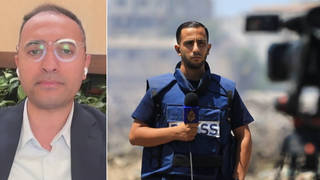
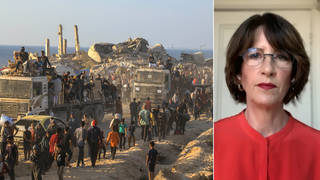
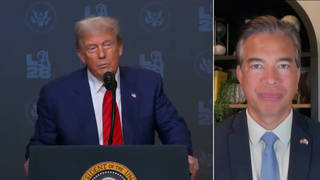
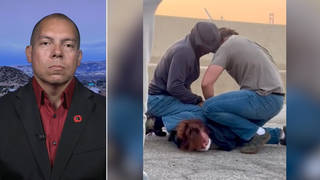





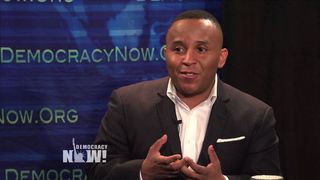


Media Options